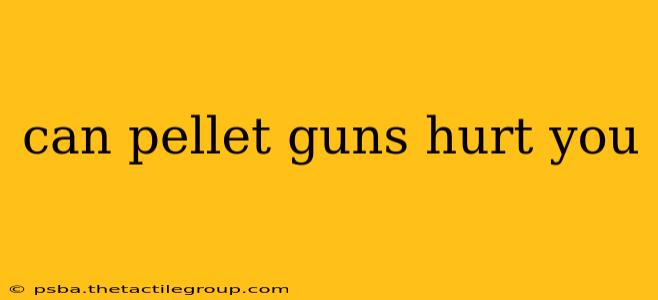Can Pellet Guns Hurt You? A Comprehensive Look at the Risks and Safety Precautions
Pellet guns, also known as air guns, are popular for recreational shooting, pest control, and even competitive sports. However, the question remains: can pellet guns hurt you? The answer, unfortunately, is a nuanced yes. While not as powerful as firearms, pellet guns can inflict serious injuries, and understanding the risks is crucial for safe handling and responsible ownership.
The Potential for Injury: It's Not Just a "BB Gun"
The severity of an injury from a pellet gun depends on several factors:
-
The type of pellet gun: High-velocity pellet rifles can deliver significantly more energy than lower-powered models. The caliber of the pellet (e.g., .177, .22) also impacts its kinetic energy. Larger caliber pellets carry more power and cause more damage.
-
The distance to the target: Pellet energy decreases with distance, but even at longer ranges, pellets can still cause injury.
-
The area of impact: A pellet striking an exposed area of skin, like the eye, can cause devastating damage. Even seemingly less sensitive areas can suffer significant bruising, bleeding, and broken bones.
-
The type of pellet: Different pellet designs (round, pointed, hollow point) impact the wound channel created. Pointed pellets, for example, tend to penetrate deeper.
Specific Risks and Injuries
Here are some specific injuries possible from pellet gun misuse or accidents:
-
Eye injuries: This is arguably the most severe risk. Pellet gun impacts to the eye can cause blindness or severe vision impairment. Eye protection is absolutely mandatory when handling or shooting a pellet gun.
-
Skin lacerations and bruising: Pellets can penetrate the skin, causing cuts and bruises. The depth and severity of the wound depend on the factors mentioned above.
-
Fractures: Especially at close range, a pellet impact can fracture bones. Facial bones, fingers, and toes are particularly vulnerable.
-
Internal injuries: While less common, pellets can penetrate deeper tissues and organs, causing internal bleeding or damage.
-
Secondary injuries: For example, a pellet hitting a hand might cause the hand to jerk, resulting in a fall and additional injuries.
Safety Precautions: Minimizing the Risk
Responsible pellet gun ownership involves strict adherence to safety protocols:
-
Always wear eye protection: This is non-negotiable. Use high-quality safety glasses or goggles specifically designed for shooting sports.
-
Handle the pellet gun responsibly: Never point the gun at anything you don't intend to shoot. Treat it as if it were always loaded.
-
Use appropriate backstops: Ensure a safe backstop is in place to prevent pellets from ricocheting or travelling beyond the intended target area.
-
Store the pellet gun safely: Keep it unloaded and locked away from children and unauthorized individuals. Use a gun safe or locking cabinet.
-
Follow all instructions: Read the manufacturer's instructions carefully and follow them diligently.
-
Never modify the pellet gun: Modifications can increase the power and make the gun more dangerous.
-
Know the law: Be aware of all local laws and regulations regarding the ownership and use of pellet guns.
Conclusion: Responsible Ownership is Key
Pellet guns can indeed hurt you, and the potential for injury is real. However, by practicing responsible gun ownership, adhering to safety precautions, and understanding the risks involved, you can significantly minimize the chances of accidents and injuries. Remember, safety should always be the top priority when handling any type of air gun.

